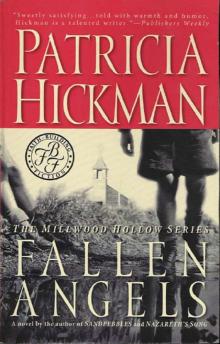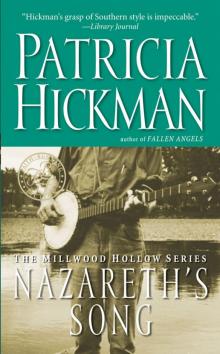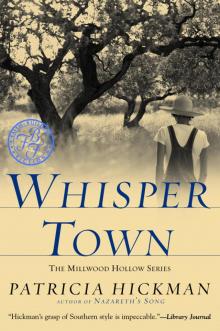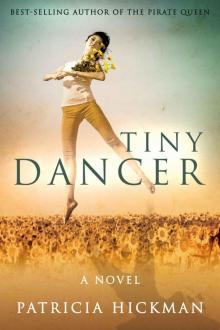- Home
- Patricia Hickman
Whisper Town Page 17
Whisper Town Read online
Page 17
Angel came into the clearing not far from where Willie kept his trot line. He kept a trap out in these woods too, but where exactly she did not know. The moon shone down on a boulder as big as the cab of Jeb’s truck. A bird called out, maybe a raven, but Willie knew his birdcalls better than she. The cold had not caused the stream to ice over and it had run hard all winter, too hard to ice. The only sound she picked up on was the raven, the stream, and a bristling wind that stung her ears. She brought her coat collar up over her ears and swore under her breath at Lucky. She peered out through the neck of the coat. The splendid dark hair moved slightly from across the stream, a flash of lightning near the water. “I see you, Lucky,” she said.
“I don’t give a care,” said Lucky. Her head went down into her arms.
“Sit over on that rock and freeze then. I’m going back,” said Angel. She came to her feet and turned away from the stream.
“I am freezing, if that makes you happy.”
“I brought an extra coat. But if you don’t want it, I’ll take it back.”
Lucky shifted and said, “You can bring me the coat.”
Angel had to roll another boulder into the water to reach the middle stone.
Lucky rose and reached out both arms, two extensions reaching in the dark, thin but strong like a boy’s arms.
Angel balanced her weight between the stepping-stones. “You got a long stride.”
Lucky rolled another boulder into the water and pressed her left foot against it. She reached her right arm toward Angel and grabbed her. Angel leaped. Her right foot kicked sideways. The water bit her ankle, icy and stabbing cold. She felt her body pulled forward out of the stream. Lucky backed away, making room for them both on the bank. Angel staggered but took two more long strides until her feet felt sod again. She gave her the coat. “Your arms feel like ice. I can’t believe we made it across in the dark.”
“After a while, my eyes grow used to it.”
“You’re shivering. I’m glad the moon’s out.” Angel kept holding on to Lucky’s arms, even after she slipped on the coat. She rubbed up and down on her arms, sure that any minute Lucky would jerk away, but she didn’t.
“I’m not jealous of you, but I’m sorry I cut off your hair,” said Lucky.
“Why’d you do it then?”
“You’re always daring me, like you don’t think I’ve got any gumption. I got as much as you, and more.”
Angel hugged herself for warmth. “I was stupid to dare you.”
Lucky smoothed the short strands of Angel’s hair. “It surprised me when I cut off such a big hank. I didn’t mean to do that.”
“Maybe I’ll cut it all short. It’s the rage now.”
“Sometimes I do things I wish I’d never done. It’s not the first time.”
“First time giving a haircut?”
“You know about that old hay shed back in those woods, the one you find if you go left down this path?”
“It’s abandoned.”
“It’s a good place for telling things you don’t want no one else to know.”
“You about to tell me something no one else can know, Lucky?”
Lucky headed down the path. “Follow me.”
Jeb fumbled his watch out of his trousers’ pocket a fifth time.
Ida May poked a milk bottle into Myrtle’s screaming mouth. “She won’t take it, Jeb. She never takes it from me.”
Jeb lifted the baby into his arms. He jostled her gently against his chest and stroked the top of her head like he had seen Lucky do on nights she had soothed her into slumber. Myrtle made a sound like sucking wind and then let out another cry, a long and drawn-out bawling scream that possessed a horrific pulse.
Willie put a pillow over his head and lay flat on the parlor floor.
“They should have been back by now,” said Ida May. “This is torture!”
Jeb paced in front of the window, gazing into the woods, not seeing a light or the shadow of girls conversing in the moonlight. An hour had passed since Angel had run out after Lucky.
Willie got up and grabbed his coat and took the lantern off the kitchen peg. “Better to be lost in the woods than stuck in here listening to Myrtle cry like a bobcat.”
“You’re not going without me,” said Jeb.
“I go all the time to check my traps, Jeb.”
Jeb bundled Myrtle into Ida May’s arms. “You’re the woman of the house till we get back, Ida May.”
“I am not,” she said. “I’m not cut out for it.”
“You are, you’ll see.” Jeb lay Myrtle’s head against Ida May’s shoulder, propped the bottle on a towel, and poked it into the baby’s mouth.
“I know what you’re up to,” Ida May yelled after them. “You’re scared of a diaper changing. At least I’m man enough to admit it!”
Jeb grabbed his rifle from the wall rack and slammed the door shut behind himself and Willie. “I think there’s a Scripture about this,” said Jeb.
“If not, we’ll say there is,” said Willie.
Back inside the hayloft, the wind did not cut through as badly as it did down by the stream. Angel and Lucky sat against the wall, listening to nothing at all. Angel had not asked her anymore about what she wanted to tell her, but held her tongue so Lucky would tell her outright and not assess what she divulged on a dare.
“When that Belinda woman used to come and feed Myrtle, I’d sneak off, lay up here, and let the sun warm my legs. I never had no place to myself except for those times,” said Lucky.
“I never had no place to myself. Wouldn’t know what that was like. Fern’s momma’s the only one I ever knew who did, but her husband had to die for that to happen. You think she’s lonely knocking around in that house, or you think after we all left, she threw off her clothes and danced naked all to herself?”
“If I had a big house like the one you said she has, I’d dance all over it.”
“We always had a lot of kids back home in Snow Hill. But we had two older brothers die, one of the influenza, the other got drunk one night and got himself killed. Then my older sister Claudia met a man and took off with him. I’d never been looked on as the oldest until then. I miss Claudia.”
“I don’t miss my sister much. She caused me too many headaches.”
“You must have fought then,” said Angel.
“We fought, but she don’t look out for no one but her own self. If she did, things wouldn’t have gotten so bad.”
Angel pushed on her stomach across the straw and then rolled over so that the moonlight fell across her face in a diagonal stripe.
“She went down to that High Cotton Club and left me on my own. I was thirteen. Didn’t know nothing about nothing, like boys and the things they do, if you know what I mean.”
“I like boys.”
“They’re no good.” Lucky crawled out as far as Angel and slumped next to her. “Especially the kind come sniffing around after Jewel. One night she didn’t come home. I heard a car pull up, a nice car like no one I knew drove. I figure it was all right to open the door to someone who drives a car like that. White shining fenders. A boy come up on our porch. Not young like me, but in his twenties. White and smiling. He wore these good clothes, like them boys who go to college out of state.” Lucky turned her face from the moonlight. “He asked for Jewel, and when I told him she was still down at the club, he asked me if I was her sister, and I told him I was. He kept smiling. I hated that smile, like it made me want to run. He told me that if he couldn’t see Jewel that I was as pretty as she was. I liked him telling me things I’d never heard before. He wanted to come inside and wait, he said, for Jewel to come home. I said he could if he’d let me see his car. He let me look inside his car and touch the seats. I never felt nothing so smooth as that leather.”
“You don’t have to tell me, if you don’t want, Lucky.”
“He said he’d give me a ride down to the corner and back, so I climbed inside.” Lucky cried. She wiped her eyes with the back of her h
and. “He didn’t take me back like he said. He drove me down to some old house where no one lived. He dragged me inside, and when I cried, he slapped me and told me to keep my nigger mouth shut.”
“When did Jewel come back?”
“Not until he had put himself all over me and took me and pushed me out of his car into Jewel’s yard.”
“Did you call the cops?”
“White cops don’t listen to colored girls, Angel. That boy told me if I told anyone, he’d kill me, and that no one would care, so I’d best keep my mouth shut.”
“You never told anyone.”
“Not until my stomach started growing with that white boy’s baby inside.”
“Your daddy got mad at you, I guess?”
“Like it was all my fault. The only one that listened to me was Ruben. He wanted to go and kill him. Jewel begged him not to, said he would get hanged and nothing would happen to that white boy for what he done.”
“What happened to the baby?”
“When I started having pains, I was scared. Daddy wouldn’t let Momma come and help. Ruben was mad. He put me in his car and drove me to the church, only no one was around. He said the minister had told him about a preacher that took in children down in Nazareth. Ruben was crazy that night. He drove me into Nazareth. Things started happening and I started screaming. He drove us down into the apple orchard. That’s where I had that baby. He wrapped it in his shirt. Then he took off through that orchard for the lights of some house. When he come back, he had stolen someone’s laundry off their porch. We wrapped that baby the best we could in clean laundry and put her in that basket. Ruben told me that I was not to blame for what had happened, that the whites ought to take care of their own kind.”
“You brought your baby to our porch?”
“Ruben knew better than to stop and ask how to find your church. We drove up and down roads all morning. Once he spotted your church, the Church in the Dell, and the house behind it, he told me that’s where we would come that night and leave Myrtle. He wrote that note. I couldn’t do it. I cried for her for days until Jewel was sick of me. The minute I laid eyes on her, I loved her. I named her Myrtle after an auntie who was good to me.”
“You’re Myrtle’s momma, Lucky?”
“Did you hear that, like a clanking sound?” asked Lucky.
Angel brought her hand over Lucky’s stomach and then up to her lips.
“Girls, we’re waiting for you down here,” said Jeb.
Angel and Lucky peeped out from the loft. Jeb waited below. A lantern flashed across the field as Willie marched along the dead grasses hunting for them.
“You been listening long, Reverend?” asked Lucky.
“Who did this to you, Lucky?” asked Jeb.
“No one listens to me, Reverend. It don’t do no good for you to try and help.”
“I want his name,” said Jeb.
“The buddy of that banker boy. Frank Pella. Myrtle’s his baby.”
21
OZ MILLS WHACKED A BADMINTON BIRDIE over a backyard net to a young girl, who, when she occasionally missed the flying shuttle, endured Oz’s correction and his taunting comments, like “Bad for you, good for me, Cousin,” or “Another point for your elder relation.” Both Oz and the girl had donned white sweaters and, even in the brisk Saturday-afternoon air of January, their foreheads perspired, wetting their hair and causing the blonding strands to stick to their cheeks.
Oz’s reputation for possessing vigorously pursued court skills would not be undermined even to lend confidence to a girl who looked every bit as old as fourteen. He slammed her last attempt to the ground. She spun her racket up, caught it, and then left him to boast alone on the wintering lawn.
Jeb seized the solitary moment. He stepped out from behind the row of cedars; not that he had hidden for the duration of the badminton game—he hadn’t. He had parked too far down the winding path to Oz’s newly purchased house, a small mansion outside Nazareth’s town limits, and hiked a half mile before he realized the distance to the tree-shrouded home.
Oz’s expression of small victory faded. “Afternoon, Nubey.”
“Glad to see me?”
“Elated.” Oz called to a woman inside the house, who brought him a towel and a drink before disappearing back into the house to tend to his young relative.
“Sorry to barge in. You beat the socks off your unwitting contender. Must feel good, I guess,” said Jeb.
“What brings you out here?” Oz asked.
“A matter that may concern you, your bank.”
“That’s doubtful, isn’t it?”
Jeb gestured to a lawn chair. Oz invited him to take it and sat across from him next to a table, where he placed his drink within a few inches of his wrist.
“The young man you employ from Hope, an apprentice named Pella, has come under scrutiny. I’m here to ask you about him,” said Jeb.
“Whose scrutiny? God’s, Nubey?”
“Maybe for now, my scrutiny until I make it someone else’s.”
“Pella’s from a good family. You already know that, though. He works for me.”
“You do know Frank, don’t you? Know him well, I mean. Not too many things get past you, like the way he talked to that young girl downtown that day you called him off.”
“I chided him for mingling,” said Oz. “Girls like her tell too many lies.”
“Mingling? Is that what you call it?”
“Get to it, why don’t you?”
“Last year, last winter, a Negro girl only thirteen got dragged away from her sister’s house in Hope and suffered things little girls shouldn’t ought to endure. The white boy who took her innocence shut her up, told her he’d kill her if she breathed a word.”
“You’ve been listening to the wrong voices, Nubey. I’m not surprised.”
“Frank Pella raped Lucky Blessed. Her brother, Ruben, felt she ought not to be forced to bring up a baby half belonging to whites.”
“She’s a liar, like I said.”
“So they gave her to me.”
“No one will believe her. I don’t.”
“Our baby-in-the-basket, Myrtle Blessed, is the offspring of Frank Pella. He’s going to jail, by the way.”
“That’s very doubtful.”
“Don’t doubt me, Oz. It’s an annoying habit.”
“Frank Pella, the accused? He’s the son of Wallace and Justina Pella.”
Jeb shrugged.
“They own a little piece of every pie in every town between Hope and Texarkana.”
“I like pie.”
“Now, you take the town of Hope. Wallace Pella holds the mortgage to a little place called the Church of Hope Eternal.”
Jeb felt like a bit of lawn moved beneath him.
“Good Reverend Williamson neglected to tell you that, I’m judging by your rosy countenance.”
“You saying Pella’s daddy owns the Church of Hope Eternal’s building?”
Oz got up and took his drink with him. “You keep saying that all the way back to your jalopy, Nubey.” The back door opened and Oz walked inside.
The servant woman holding the door open asked Jeb if he was coming inside.
Jeb shook his head. He closed his eyes. It was a long prayer back to the truck.
“You are implying I sacrificed this girl for the sake of my church building,” said Louie Williamson. “Maybe I should have forced her to go to the law. I did tell her, but I knew she wouldn’t go. I have known the law. It doesn’t honor our kind, Reverend Nubey. Lucky Blessed’s only covering is the blood Christ shed for her.” He sat back on his chair and it groaned. “We know too well what it means to trust fully in God.”
“You knew all along.”
“I only suspected. She never gave me the name of the white boy that did this to her.”
“She was protecting you.”
“Maybe protecting all of us. Big load for a child. Think about it.”
“Frank Pella is a monster.”
“I’m not afraid of monsters, Reverend, only the men who bow to them.”
Jeb came down on his knees, next to the shrunken candles where he and Louie had last prayed. “I want you to give a message to someone for me,” he said. He handed him a note.
“I’ll try my best,” said Louie.
Jaunice had not switched out the old candles with new and the cold melted wax of penny candles failed to offer the same monastic elegance to Louie’s sparse study as Jeb had observed during his last visit. “Tell me what to do, Louie.”
Louie Williamson watched Jeb cry. Maybe he had already surrendered his daily portion of tears or it could have been he simply honored Jeb’s right to cry with a fresh awareness of injustice. Louie possessed the look of a man well-practiced in wakefulness. Either way, he did not have to say much of anything.
Jeb figured out how to interpret the silence of a friend. It sheds its own light.
Deputy George Maynard stared out his window. He kept saying things like “Sure as the dickens, it’s been a long winter” and “Some say another snow is headed our way.”
Jeb said, “George, have you listened to anything I’ve said?”
“Girls like that Angel of yours and the little colored girl, they got fertile imaginations, Reverend. It don’t bother girls like them any to tarnish a family name. It’s good you came to me first. Careful where you carry such tales.”
“Is that your advice?”
“They don’t know the meaning of a good name, not that you haven’t done charitable by both of them, and improved your own standing in town, Reverend.”
“This isn’t about me, my reputation, or my charitable works, George!”
“I think you’ve caught this child in her own shame. Strange that over a year passes before she comes up with a story. I know of the Pellas. They wouldn’t stand for slander, I tell you the truth.” George could not stop staring out the window; Jeb wished the snow would start and get it over with, so George could concentrate on the matter at hand.
“She told me that no one would believe her.”
“Why should anyone believe her?”

 Painted Dresses
Painted Dresses The Pirate Queen
The Pirate Queen Fallen Angels
Fallen Angels Earthly Vows
Earthly Vows Nazareth's Song
Nazareth's Song Whisper Town
Whisper Town Tiny Dancer
Tiny Dancer